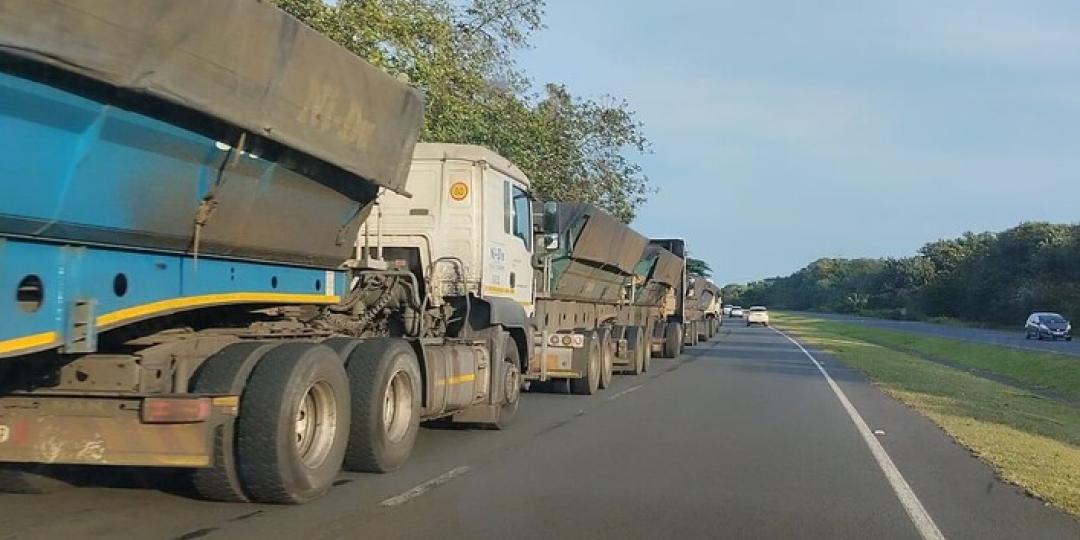With dire predictions that the Port of Richards Bay's handling of coal trucks is grinding to a halt, Transnet National Port Authority (TNPA) has confirmed that they will address the issue of failing to deliver coal by rail.
TNPA said it will hold a press conference to shed light on how it intends to clear up the road backlog, but has yet to announce a date for this media briefing.
Meanwhile on the N2 highway – gridlocked by trucks waiting to offload export coal at the port – things are worsening daily.
On Tuesday, the suburb of Alton had no access at all, and the Kraft link was completely blocked off.
Mike Patterson of the Zululand Chamber's Business Forum on Road Issues, receives desperate reports daily on the impact of up to 1 200 tipper vehicles per day accessing the port.
If this is not handled properly, it congests access roads in the Richards Bay and Empangeni areas.
According to reports, no TNPA staff are on-site to manage the mess, but local traffic control is working 24/7 in an attempt to control the number of vehicles in the city at any one time.
"With regards to the media conference, I know nothing about it,” Patterson said.
“We certainly have received no invitation to attend it and really do not know what they can say except to tell us about a deliverable solution to the problem.”
Businesses are now seeking a total moratorium on trucks parking on any public roads.
They should all be parked and offloaded within the port and not within the municipal boundaries of the entire City of uMhlatuze, which includes Empangeni and rural areas.
This moratorium must hold until the port authorities can take full responsibility and handle the cargo.
Trucks must go in, offload, and then leave in a controlled and orderly fashion. No trucks should be parked on any road or address of delivery to wait for offloading.
According to some social media groups, the situation is so dire that there is now a suggestion from locally affected businesses that the High Court should be approached to deny trucks access to roads for parking.
Because Empangeni has banned tipper trucks from driving through the town, the vehicles are using Ngwelezane Road to access the N2.
All roads have been badly damaged by the volume of trucks – a load they were not designed for.
Late last week, a message from Patterson to affected colleagues updated them on the state of disarray.
"The situation is dire at the N2,” he said.
“The trucks have gone beyond the Nseleni Bridge, and reports from both the Road Traffic Inspectorate (RTI) and the City aver that the port processing and/or calling of trucks is grinding to a halt."
Another affected party agreed with this view on social media and begged Transnet to deal with the calamitous situation once and for all.
Truck drivers now use the port precinct as a truck stop before exiting the port, exacerbating what has become a chronic situation.
Reports indicate that the coal truckers are also insisting that all trucks must join the kilometres-long queue into the port, even though, in some instances, their destination is not to deliver coal to the port but chrome to a nearby smelter.
An attempt to resolve the issue has resulted in numerous meetings and promises between interested civic organizations, business bodies, and Transnet.
These interactions seem to confirm that nothing is being done to reduce the number of trucks bringing coal to the Richards Bay area.
Dealing with the damaged rail line linking the Mpumalanga and northern Kwa-Zulu-Natal coal basin is not on the agenda, it seems.
The Richards Bay Coal Terminal (RBCT) is continuing to export coal delivered by rail.
It exports coal sourced in South Africa that is received by rail for its clients overseas.
The rail line faces disruptions along the route when trains are stopped, and equipment, which includes batteries, is stolen, causing backlogs that impact the coal reserves held at the coal terminal – one of the largest in the world.













